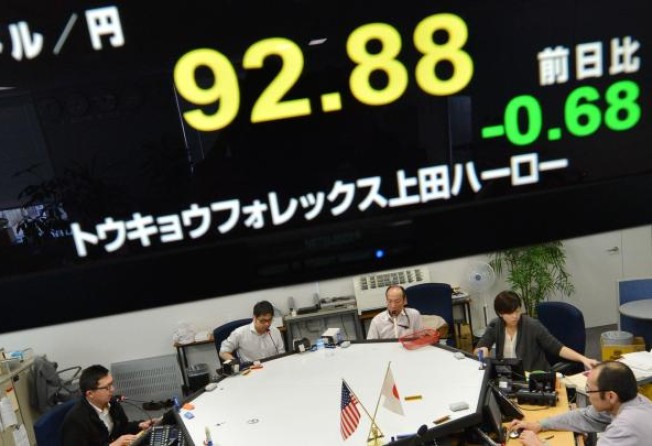Japan cast as villain in global currency war drama

Japan is being cast as the villain in a heated currency drama, accused of driving down the yen’s value to shore up its fragile economy, as a statement from financial powers fails to reassure markets ahead of G20 talks.
A global war of words has seen the new government in Tokyo reject claims of manipulation, and reasserting its mantra of big spending and aggressive monetary easing is meant to boost the economy after two decades of limp growth and deflation.
The rhetoric of Shinzo Abe’s fledgling administration, however, has sent the yen tumbling in recent months, angering some European officials, who hinted at their own intervention to tame the soaring euro and protect exporters.
With talk growing of a global war in which nations weaken their currencies to gain an export advantage, the Group of Seven richest nations waded into the debate to warn forex market turbulence would hurt financial stability.
“We... reaffirm our longstanding commitment to market-determined exchange rates and to consult closely in regard to actions in foreign exchange markets,” said a brief G7 statement.
G7 Members -- Britain, France, Germany, Italy, Japan, the United States and Canada -- would keep fiscal and monetary policy limited to meeting “our respective domestic objectives” and “not target exchange rates”, it added.
Market uncertainty over the G7 message initially pushed the yen down on bets it meant the the group was backing Japan’s economy-boosting efforts, but the unit quickly reversed course.
Analysts said the comments were squarely aimed at scolding Tokyo, as talk of a global currency war heats up ahead of this week’s meeting of the Group of 20 top economies in Moscow.
German Chancellor Angela Merkel has openly questioned Tokyo’s policies while France is calling for a debate and action to protect eurozone exports.
However, European Central Bank chief Mario Draghi has sought to play down any row, calling the idea of a currency war “way overdone”.
Japan’s Finance Minister Taro Aso cast the G7 statement as a rebuke to those who have accused Tokyo of tinkering with the yen, claims more often directed at China which has long been accused of manipulating its yuan.
“That is not the case, and the rest of the nations (in the G7) have properly, correctly understood this,” Aso said.
National Australia Bank (NAB) saw it differently, saying the comments were a “shot across Japan’s bows” that came as the Bank of Japan began a two-day policy meeting.
Markets are waiting to see if Bank policymakers unveil fresh easing measures, which tend to weaken the yen.
Aggressive monetary easing has been a key priority of Abe’s government, which swept to power in December on a pledge to rescue the economy and to urge the independent BoJ to follow its line or be forced to change.
“Europe’s objection to Japan’s guiding its currency lower appears stronger than earlier thought,” said Hiromichi Shirakawa, a research analyst at Credit Suisse in Tokyo.
The statement could temper Japanese officials’ frequent musings about the value of the unit, and influence future policy, he added.
It will “make it extremely difficult for senior Japanese officials in the future to make comments like ‘100 yen to the dollar would be fine’.”
The yen has tumbled 17 per cent to 93.00 against the dollar and 25 per cent to 125.00 against the euro since mid-November when the former government called an election that was widely expected to be won by Abe’s opposition.
However it is still well below lows around 123 yen to the dollar and 170 against the euro seen in 2007.
But the recent weakening has bolstered Japan’s exporters, who spent last year complaining the strong unit was ruining their finances, as they struggled to recover after the 2011 quake-tsunami disaster.
The yen hit a record high around 75 to the dollar in late 2011, making Japan’s exporters less competitive while shrinking their overseas income.
The strong unit helped push Japan into a record trade deficit last year.
“Japan can’t deny that, in its heart, it thinks a cheaper yen is desirable for the export sector,” said Keiichiro Kobayashi, professor of economics at Tokyo’s Hitotsubashi University.
But a weaker yen is double-edged sword as it drives up import costs and makes overseas investment pricier.
Even some of the biggest beneficiaries are not cheering, with the heads of electronics giant Sony and Suzuki Motors warning the weakness may not last, whatever Tokyo’s intentions.
“It’s premature to think that the yen’s devaluation will continue,” Osamu Suzuki cautioned.